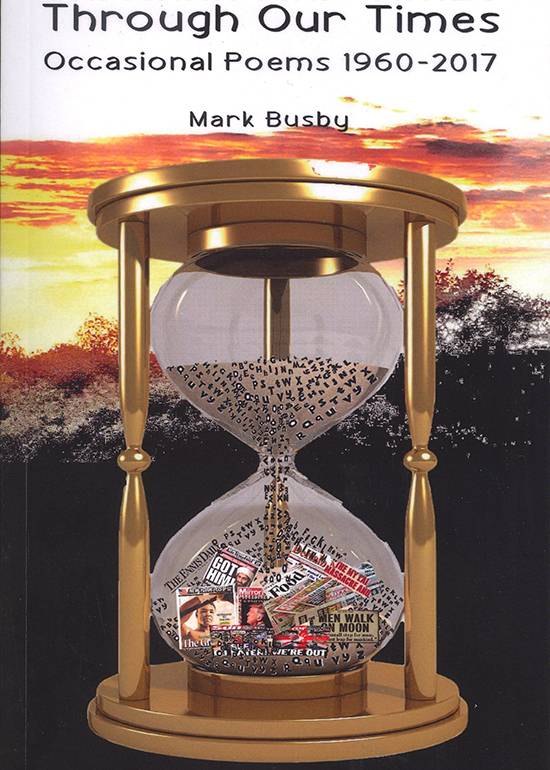Come Gather 'Round

Through Our Times
By Mark Busby
Beaumont: Lamar University Press, 2017.
107 pp. $15.00 paper.
Reviewed by
Jane Manaster
Mark Busby shares a memoir in poetry revealing events, emotions, and wisps of thought. The path of life zigzags, so with a mere semblance of continuity he writes of the humdrum, the exceptional, and his childhood. Busby sets down memories, some that we can empathize with, but others are completely his.
The poems cover a lengthy span, from 1960 to the present, from his boyhood in a small Texas town where the magic of a Coleman lamp hid “the secret of systematic success” and bales of cotton with their “unctuous stench” dependably appeared each autumn. In a gentler and likely better and safer time, remembered by few of us, he sees the spinning bottle at Community Center parties, the promises to halt at the chosen girl and hope for a “wondrous kiss.” And every so often Busby returns to the front porch of his home where sitting on a rocking chair is a sentiment called up now only by waiting customers on the porch outside the highway Cracker Barrels.
All too soon Busby’s recollections shift to a crueler phase as Vietnam looms in his immediate future. The first poems suggest his sense of detachment toward the soon-to-be tragedy, dismissing reality as the plane jets towards Georgia, preparing for a new experience tinged with excitement. Together with the group of recruits aiming to succeed on their physical training tests, he describes the challenge:
…. to crawl forty yards in 21 seconds or less.
I consistently finished under 18,
While my fellow candidates, otherwise good athletes struggled.
I turned my fatigue shirt backwards
For more protection and less friction
And imagined the movement of an alligator.
At officer training in Fort Benning after the massacre at My Lai, the defiance of the Geneva Convention, the horror of the massacre stayed deep within him. His personal recollection swims to the surface. The scene outside the Judge Advocate’s Office with a disconcerting, ever memorable encounter:
….A short man in officer greens
Sitting on a bench off to the side,
So short his feet didn’t reach the ground.
His nametag confirmed he was Lt. Calley….,
So I walked up, saluted, presented myself
As his driver for the day.
Calley looked uncomfortable,
His eyes darting side to side.
Ease up, soldier. Call me Rusty
And just take me to Miller’s Discount Store…
Stepping back into his childhood Busby captures an awakening conscience. In a word he matures, reaching out beyond the conservatism of his confining small town upbringing. But Busby is at his best when he steeps himself in the angst of academia. A youngster used to hearing Lyndon Baines Johnson impugned, he was old enough by 1976 to have mixed feelings:
…tempered by the virulent attitudes
all around me at home,
attitudes that made Dallas
an infamous city.
How ironic to grow up anti-Johnson and pursue a career in the late President’s alma mater! To the outsider, universities present an ivory tower existence, no thought given to the boredom of repetitive semesters, the tired curriculum, the grading. Students have a sameness after a few years, their intelligence, enthusiasm, and motivation become a perpetual challenge, alongside the ennui. In “Grading” one can only sympathize with the sentiment:
Your mind is mushy, and
You have too many spelling errors.
Your organization lacks clarity,
is fuzzy and repetitious,
overlapping, and disunified.
For sure, Busby’s writes best in such a poem as the one tucked way in the latter part of the collection, a poem about his colleagues, “Imeritus”:
They are the walking dead,
Withered, pasty, eyes glazed
And pupil-less, like zombies
In a 1950s movie.
Poetry today tends to rant or rave but this isn’t Busby’s style.
It recognizes fashion no less than other genres of personal memoir. It is dictionary-defined as poetic qualities however manifested or poetic spirit or feeling. Both sound almost old-fashioned.
Length and rhyming sustained a pattern for generations, even centuries. But rhyme has played second fiddle to emotion since the poets of the Great War found the technique not worth taking the extra time needed with the sound of the battlefield so close at hand.
Today brevity is the defining word. Poetry as Twitters. By this definition Busby’s short, jolting memories are almost avant garde.
Jane Manaster is a freelance writer and geographer.
